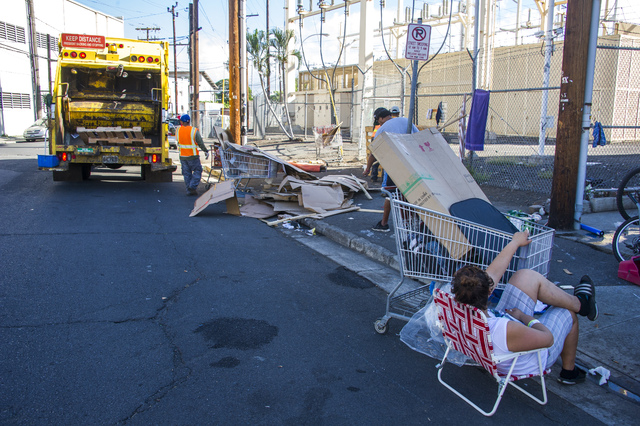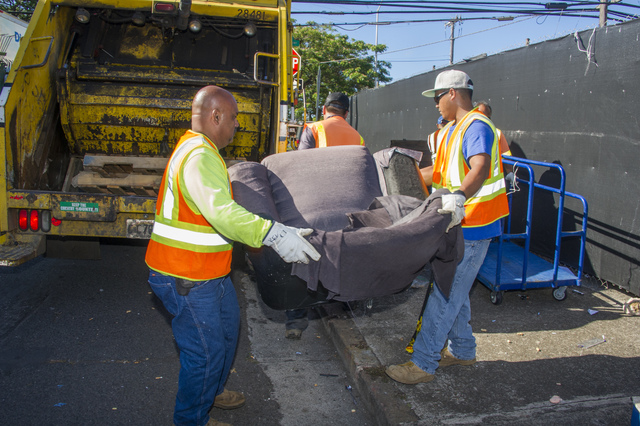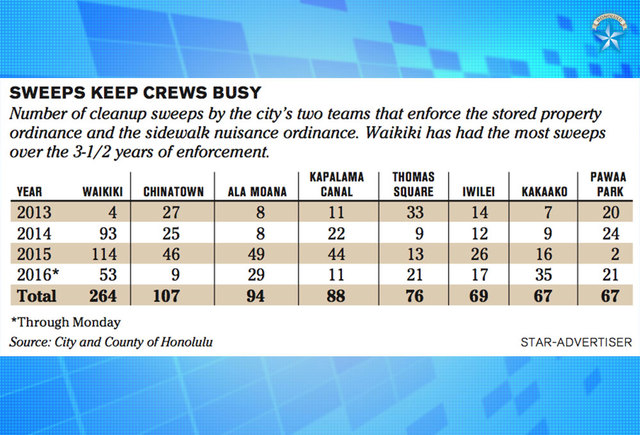Weekly cleanups provide temporary respite from homeless and their belongings

CRAIG T. KOJIMA / STAR-ADVERTISER
Bryanna Tunai, right, watched a city crew remove cardboard and pallets from Kuwili Street in Iwilei on Monday.

CRAIG T. KOJIMA / STAR-ADVERTISER
A city cleanup crew conducted a sweep in Iwilei on Monday, targeting homeless encampments on Sumner, Kuwili and Iwilei streets.




The smell of urine emanated from the sidewalks of Iwilei on Monday as the city’s homeless enforcement team returned to once again break down makeshift shelters built out of cardboard, tarps and wooden pallets — one of hundreds of sweeps that have taken place since the cleanup crew was created more than three years ago.
Monday through Friday the so-called SPO/SNO Enforcement Team discards — and stores — tons of personal belongings from Oahu’s homeless encampments at a cost to the city of about $15,000 a week.
The team got its inelegant name from the two city ordinances it enforces: the stored property ordinance and the sidewalk nuisance ordinance. One enables the removal of private property on city land, and the other keeps sidewalks clear.
|
CLEANING UP AFTER THE HOMELESS A special cleanup crew has collected tons of homeless people’s possessions and garbage since its creation in January 2013. 139 TONS Don't miss out on what's happening!Stay in touch with breaking news, as it happens, conveniently in your email inbox. It's FREE!
By clicking to sign up, you agree to Star-Advertiser's and Google's Terms of Service Opens in a new tab and Privacy Policy Opens in a new tab. This form is protected by reCAPTCHA.
209 TONS 341 TONS 162 TONS * Through Monday; includes material collected by an additional three-person team created in March 2015 to clear encampments from city parks Source: City and County of Honolulu |
But, as the residents and businesses of Iwilei have learned, the Monday sweeps only clear the area for the inevitable return of the area’s homeless.
Karen Manuluata, 25, and her boyfriend, Rick Tataishi, 34, spent the night on state-owned Nimitz Highway, just around the corner from where the SPO/SNO Enforcement Team was clearing city-owned Sumner Street.
“In two months we’ve been swept five times,” Manuluata said. “I’m not used to this. It’s hard. We have nowhere to go.”
The SPO/SNO Enforcement Team represents what Mayor Kirk Caldwell calls “compassionate enforcement” to encourage homeless people such as Manuluata to give up life on the street and instead move into a shelter or the city’s nascent Hale Mauliola community on Sand Island.
The team has been operating since January 2013 as part of Caldwell’s plan to deal with Oahu’s intractable homeless problem and respond to complaints from businesses and neighbors.
In communities such as Iwilei, where complaints connected to the homeless have increased in the last few months as more of them move in, the team’s Monday sweeps have become an unwelcome but expected part of life for the area’s homeless.
On monday about a dozen people who spent the night on the sidewalks of Kuwili Street were already packed and on the move to another neighborhood when the team rolled in with dump trucks and police escorts around 8 a.m. to find only two remaining encampments on either end of the street.
While others were still walking out of Kuwili Street, Bryanna Tunai, 21, sat in a beach chair outside her structure eating a cookie as the enforcement team’s dump truck noisily crushed pallets, plywood and the remains of someone else’s encampment.
“We have rights,” Tunai said.
Tunai is a veteran of the street who, like untold others, has grown both accustomed to — and weary of — the incessant sweeps that some say merely push homeless populations into neighboring communities.
“I’ve been out here since I was 16,” Tunai said. “The sweeps don’t faze me. We go back and forth between here and Aala Park.”
The work is not pleasant for the seven-person crew, which was joined by a separate, three-person “roving park patrol” in March 2015 to do the same work in city parks.
The crews sometimes work 17-hour shifts in order to clear city streets and enforce park bans that begin at 10 p.m., said Ross Sasamura, director and chief engineer of the city’s Department of Facility Maintenance.
In addition to harassment from the homeless people they remove, the crews are always on the lookout for hypodermic needles and “toilet buckets” filled with human urine and feces.
“When they leave, they leave their trash for us to pick up,” Sasamura said. “As a result of the sweeps, they’ve added mobility to their list of skills. Some of them scale down on the items they keep with them, and others find wheeled objects to help them transfer.”
Sasamura’s crew spent six months in the fall methodically breaking down the entrenched Kakaako homeless encampment. As it grew into a major safety and public health problem, the encampment crystallized Oahu’s need to deal with what has become the country’s highest per-capita rate of homelessness.
In the aftermath of the Kakaako sweeps, the city in January settled a lawsuit filed by the American Civil Liberties Union of Hawaii that alleged it failed to provide notice of the sweeps and destroyed belongings rather than store them to be reclaimed.
Sasamura said he was barred from discussing the terms of the settlement.
But he said the enforcement team now gives homeless people a 30-minute heads-up before sweeps commence. Those whose possessions are taken get a claim ticket for their items, which must be stored for at least 30 days in an undisclosed location in Halawa.
The city also announces the next day’s sweeps on its website by 3 p.m. each day, Sasamura said.
In a statement, Vanessa Chong, executive director of the ACLU of Hawaii, said, “City practices and policies during sweeps have been changed as a result of the lawsuit,” and the ACLU “continues to monitor city activities in the removal of private belongings on city property.”
Philip Richardson, president of Current Affairs, an event-planning business on Pine Street, said the ongoing sweeps are not a permanent solution, but they’re necessary to keep the neighborhood safe.
“They need to focus on picking up the carts, otherwise the homeless just rebuild again,” Richardson said. “But there is a marked difference between when they conduct the sweeps and when they do not in terms of violence, drugs and overall safety. If it were to discontinue, I would be extremely concerned.”
45 responses to “Weekly cleanups provide temporary respite from homeless and their belongings”
Leave a Reply
You must be logged in to post a comment.





Bryanna Tunai, 21, is the poster child of willful homeless with his shibai statement, “We have rights.” Well Bryanna, taxpayers have rights to. They expect people to act like adults, get a job, pay their living expenses, not subsidize the life of lazy people. Perhaps some day you too will realize you have failed in your responsibilities, realize you are just lazy, get off your rear end and join the workforce.
Vanessa Chong, executive director of the ACLU of Hawaii, is the next poster child for the homeless. Admitting to everyone the ACLU’s limitations, will not actually assist the homeless change their lives by getting a job, a real place to live, a real life. No, the ACLU does what it does best, wasteful litigation to justify its existence. Nothing of any real substance to help anyone get their life back together.
Yes, so many people admitting their limitations. Dirty Harry AKA Clint Eastwood would be proud of them.
Don’t pay rent and you can afford other things. The moment they are observed putting up a tent it should be taken and the moment they have stolen shopping carts they should be arrested and thrown in a fenced conc camp.
A chain gang would be appropriate for these people when they break lawa. Have them clean homeless camps, streets, parks, other public places.
locally: spot on!
The man lazing in his chair while city workers have to clean up after him is telling. The homeless can at least help city workers clean up the mess they make.There is plenty of work to be done in the city. Please get to work.
“That’s not a woman, That’s a man, baby!”- Austen “Danger” Powers
If the store owners like COSTCO, Longs Drugs who’s shopping carts provide the homeless with the transportation of their trash would press charges for theft of their carts it would make the enforcement by the Police easier and would put a burden on the homeless. Most of these companies are investor owned and theft of these carts is an expense added to bottom line. See a homeless thief with a cart have the Police stop them remove all the items from the cart and hand the cart over to its rightful owner. These business’s should do there part and help instead of just complaining to Police.
With all the money spent on equipment and manpower on these cleanups they could have built some actual housing.
Really, brah get it together. These people don’t want housing or rules. Sand Island, and the Next Step Shelter get openings, but these people say no where to go typical BS.
The SPO/SNO Enforcement Teams, Hawaii’s unsung heroes! Thanks for all you do!!!
Ditto!
They could get more accomplished with fire.
Cat n’ mouse
I would have the homeless throw away all the trash into the trucks. Why have city workers do the work since they didn’t create the trash. If the homeless refuse, arrest them for littering.
But then the homeless would have to actually lift a finger, and you know, do some work. Surely we can’t ask them to do actual work, can we?
Have that guy sitting on the chair watching pitch in. He is a leech off of society.
Got that right. Perfect person to work for HART and Nei rail. Another leech on Nei taxpayers.
Hmmm. Good point, but again the ACLU would likely protest, and it seems our criminal justice system can’t handle any more cases, so the name of the game is to avoid arrest and prosecution whenever possible.
How about having the ACLU clean up after them!
When we see members of the ACLU out there helping out the neighborhoods, shop owners, people with just as much right to “civil liberties” as the homeless, they will win back their credibility. At present this organization has as much usefulness as a blogger or a tweeter.
Excellent idea, PMINZ !
agree
Tax Payers have assumed the Role of House Maids, Janitors for the Hobos, Bums, Freeloaders, Tramps, Vagrants, Professional Homeless, Feral Humans.
Wonderful descriptions. i will add: Subhumans.
PMINZ: they have adapted and copied our DNA. (South ParK)
The refuse from the wretched refuse of our teeming shores.
All the die-hard members of the ACLU led by Vanessa Chong should be at the forefront in cleaning up after the homeless instead of “spitting out”comments about Homeless Rights etc…. and this individual in the column that talks about “we, meaning they the homeless, have rights” OH PLEASE, give me a break…..I am not really heartless but when I read about the contents of the trash that these city and state workers have to endure in cleaning it up, that would be cause for STRIKE…the UPW should just strike and let the homeless cleanup after themselves….what a pigsty!!!
i sorry man i no feel sorry for you guys
our time us went work 2 jobs if gotta
you guys no mo shame
go way already………….no go way mad………..just go way
well stated.
Been dealing with these people on and off for the past 30 years. I used to have compassion but after all these years I feel they are just a bunch of sponges. They just sit there and squeeze as much out of us that they can. They have no dignity, no drive no pride and basically just don’t give a darn. They should be bullied and pushed. At every turn they should bean eye on them. No more chances. Just keep harassing the heck out of them. I rather pay for that than helping them anymore!
There is nothing illegal if the owners of property the homeless tend to live on (city and state) to install large, uneven, boulders to completely eliminate the ability of anyone to erect housing on. As in the area in this picture, between the sidewalk/street to the fence line. Leaving just the sidewalks and streets for them. Meaning they will have to go somewhere else.
Same should be done for the areas under freeway on and off ramps. By eliminating the areas where they live and contaminate with trash and hazardous materials.
Not trying to sound cold hearted but by reducing the clean up areas more money can be used to actually assist those in need. Doing the same cleanups over and over and over is just another taxpayer money pit.
Unfortunately, enforcement is the only effective response. There are options, and plenty available to most of the homeless at a high cost to taxpayers. Discourage the new ones from coming and enforce the remainder. HPD needs to set up a homeless task force and holding facility.
They should take all the shopping carts & return them to their rightful owners.
While you readers/posters drive in to WORK in town from Ewa side, look under the Middle St. overpass and along the freeway fences. The homeless and all their TRASH is popping up like weeds! The Middle St. bunch have all their rubbish rolling down the hill just stopping at the edge of the ewa bound right lane. I called the State DOT to clean up that mess as that’s a big liability about a month ago and NO ACTION.
Homeless in these areas have proven one thing. They are irresponsible and could care less about society. They want things handed down to them…free of charge. Time to get tough with this segment of the homeless. Withhold their welfare checks and make them work for it. They can pickup rubbish, repaint graffiti, cut grass, empty rubbish cans, etc. No free lunch in this life. WORK!
Not sure if this can legally happen but how about the state/city charge a fee for storage. If the owner wants their belongings back, then they have to pay the storage fee to get it back. If not claimed within 30 days, then discard the items. The collected fees can off set some of the program cost. If the owner doesn’t want to pay any fees, he/she would probably remove the items himself so it won’t get confiscated. At the same time, not too sure how much confiscated items are picked up from storage only to be confiscated again in another sweep. This fee can also help the work crew from not having to confiscate the same items over and over when the owner claims them only to bring them back to their new camp to be confiscated again.
I think might not be possible with the ACLU but I doubt many claim their belongings in Halawa.
What is needed here is an investigation by Gina Mangeiri to make the public aware what is involved to have these items stored by the City i.e. the amount of resources that go into these sweeps, what the city workers have to do during these sweeps, where and how much trash is stored and finally the real exact cost. When the public sees this and knows that is is from the ACLU maybe then they will turn their focus on the ACLU. Believe if the public (taxpayers) see whats involved and how much of their money is spent they will begin to focus their efforts on the ACLU.
The smell – must be those spots on the pavement.
Maybe this should be compared to bulky item pickup provided by the City free for homeowners, where people leave large hulking pieces of junk curbside and the City hauls it away for them. I’m betting they pick up a lot more junk from homeowners than from the homeless.
There should be twice daily high pressure hosing down of these areas to alleviate the smell of the waste left behind by these freeloaders.
Homeless = (un)sanitation = disease (hep a)
Police should confiscate ALL shopping carts, hold them for 15 days and if stores do not collect them, smash and trash all of them
Hope the storm cleaned out the shanty areas.
Take that guy’s shopping cart and chair.